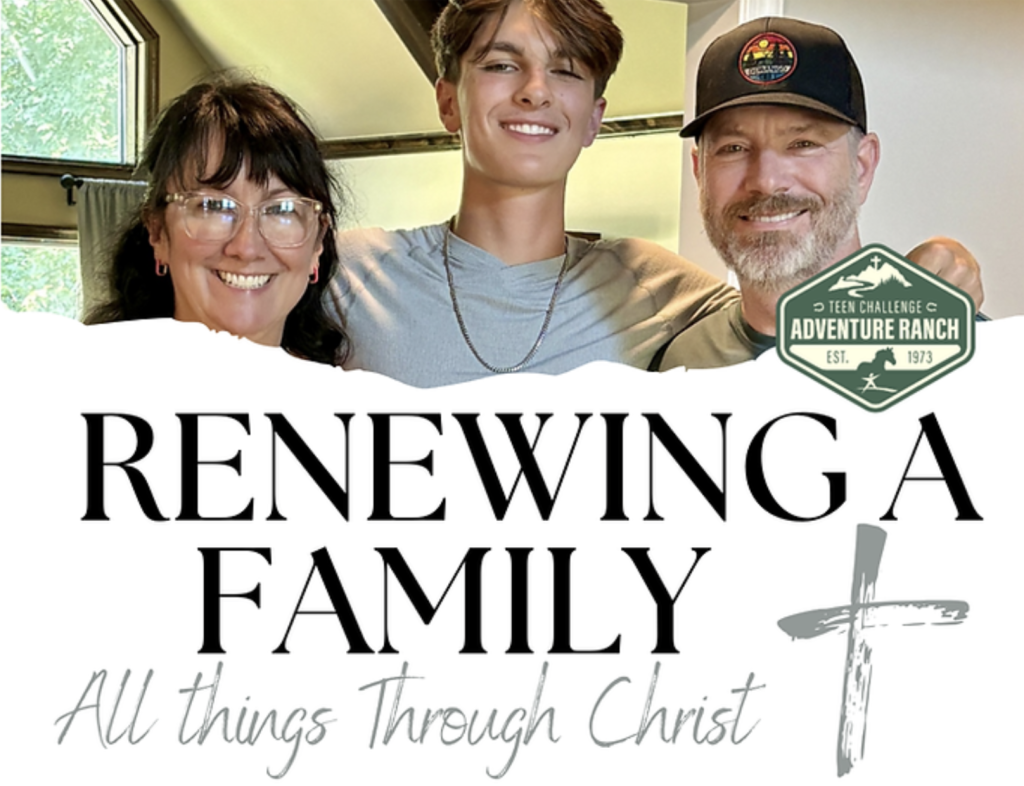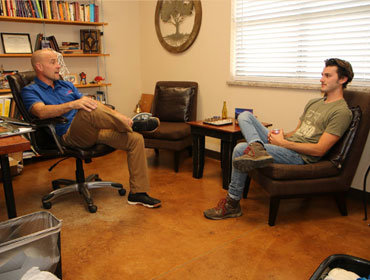The teen years can be challenging. For some, drugs, defiant behavior, and difficulty getting along with parents can be the beginning of a lifetime of struggle that leads to addiction, incarceration and even death. Early intervention through Christ-centered residential mental health treatment for teens can bring a whole family back together.
“We are not the same family and for all the right reasons. This has been such a huge time of growth for us. We needed this shake up. We are a little over two years out from TCAR and Ethan is doing amazing because he chose to take advantage of what was before him, and so did we. He’s matured in so many ways and we can’t wait to see what’s next!”
A Moment of Realization
It was the evening of Easter Sunday and after a great day with family, we were winding down with our normal pre-week routines. Our son, Ethan, was supposed to turn in his cell phone but hadn’t come down from his room. When my husband went to retrieve the phone, Ethan didn’t answer his door.
My husband continued to knock on the door with persistence. When Ethan finally opened it, it was clear that he was high.
This was the first moment that mother, Lori McMurphy, realized her son was using drugs. What she did not yet know, is that the drugs were an attempt to self-medicate a more serious mental health struggle.
Ethan was like most other teens. He spent time in his room, played video games, made the high school baseball team, and did well enough that beyond “not really applying himself,” he didn’t give his parents much reason to suspect a problem.
Lori McMurphy candidly recalls the ‘beginning’ of her family’s journey with residential treatment. Before this moment, the McMurphy family was like any other family that you might meet in Church. They’re strong Christians with a close-knit family, the mother of five, explains.
Parenting Through Escalation
First, it was drugs. Then, came the lying and running away and self-harm. “Things quickly became very tense in our home. We set boundaries and they were ignored. We enforced consequences and he rebelled. At one point, we made our son sleep on our bedroom floor so that we could keep him in the house.
We put plastic shopping bags filled with shoes hanging from the door handles so that we would know if he tried to sneak out. And yet, somehow, he still managed to sneak out one night! There were several nights I stayed awake all night long just watching him to make sure he wouldn’t leave.”
Lori talks openly about the struggle that she and her husband faced trying to keep their son alive and healthy. She said that there were times that it didn’t feel like he was safe anywhere. She even noted that his main source of drugs was from a kid at church!
“I spent nearly every night for more than six months terrified that my son was going to hurt himself or die from an overdose. When he would sneak out, it was usually through his second story window. We installed security cameras around the entire perimeter of our home. Thankfully, my husband and I were very united in setting and enforcing rules for our son during this time, but it never felt like enough. And enforcing rules often ended up in a blow up and even became physical more than once.”
Seeking Treatment
When we first found drugs, there was an initial week-long placement for a mental health evaluation. It was the months following the COVID-19 pandemic and access to mental healthcare was hard to find. It seemed like every facility had a months-long waiting list and help beyond an evaluation was just out of reach.
On the way home from this placement, Ethan seemed like his old self. He was relaxed and talking of his adventures and for that moment Lori felt like things might be okay. Then, almost immediately after returning home, she caught him huffing on an aerosol can in his bedroom.
After that, they tried to manage care at home. Over the next several months, life for the McMurphy’s was a combination of closely monitoring Ethan, homeschool, once a week outpatient therapy, and taking care of their other kids.
Escalating to Self-Harm
“School ended and we managed to make it through June and July with very little incidents. Then, in August our son had asked if he could go hang out with some friends after church. He was grounded so the answer was no.
He then went upstairs and used the clip off of a pen to cut his face from above his eyebrow to the middle of his cheek, he also cut a few places on his arm.”
Seeing this escalation, alarm bells are going off in Lori’s brain and she and her husband decided it was time to look for a placement for him that night. Thankfully, this time they found a place that was local, and it would be a 30-day placement.
“Our family needed a break from trying to keep Ethan safe and alive. We had other children at home, and they needed our attention as well. It was unbelievably hard dropping him off, but we were so desperate.”
This facility kept him safe while we looked for a more suitable solution. Then, it came–we found Teen Challenge Adventure Ranch. We were a Christian family so we knew that we wanted a faith-based program, but we also needed a facility that could manage Ethan’s medications.
TCAR was exactly that facility. They offered a Christ-centered treatment option with prayer, chapel, bible study and discipleship along with onsite therapists, 24-hour nursing, and medication management.
“Once we got in touch with their admissions team, things happened pretty quickly. We had a few phone calls to work out insurance and billing and then we were on our way to Arkansas to admit our son.”
Intake Day
Intake day can be hard for a lot of different reasons. Parents often feel conflicting emotions. It can feel like a relief that you’re finally getting a break from the chaotic, tense, draining experience of trying to parent a teen with addiction, mental health, or behavioral problems.
You might feel shame or guilt for sending your son away. You might feel hopeful, trusting that you are making a difficult decision now for a better future down the road. You might feel sad, embarrassed, fatigued, stressed, overwhelmed, or in a daze.
The morning that Lori McMurphy and her husband brought their son to Teen Challenge Adventure Ranch, she remembers watching her son climb out of the car. His hoodie fell down and she saw several hickies on his neck. The night before, he had attempted to run away and was at a girl’s house–the evidence of that excursion was currently staring this fraught mother in the face.
“I wanted to hug him and punch him at the same time.” She says, “I was sad, mad, and hopeful and these conflicting emotions were just swirling around. I could not believe that this is where we were as a family.”
Intake day can be really overwhelming. There is a lot of necessary information to cover, but you’re also emotionally overloaded and exhausted. It can feel almost surreal as new faces come in and introduce themselves and hand you papers, binders, and books to read.
“I remember that we went through all the steps, and we did what we were supposed to do, and then we got in the car and as we started to drive away–I thought, Good Riddance. I don’t ever want to see this place again.”
The Fallout Back Home
As the McMurphy’s returned home without their son, they felt an unfamiliar sense of peace. The heaviness that had been crowding their home for the past several months seemed to dissipate in the absence of their middle son.
One of the smartest things that Lori says she did was find a therapist for herself right away. While her son was in residential treatment, she knew that she needed some help to process the trauma that she had been living through.
It’s not always easy for parents to seek or accept help. Choosing a residential treatment placement for a child is a big step. Engaging personally in the therapeutic process is even bigger.
Those first weeks were a bit of a blur. Lori and her family continued to adjust, which wasn’t always easy. While their son was doing well at TCAR, he wasn’t thrilled about spending the next nine months away from home with all the rules and structure.
Even when a teen recognizes they need help, they resist the idea of getting help. Sometimes they initially agree to go to treatment only to try and find a way to get kicked out or sent home later. The McMurphy’s son was no exception.
More than anything, Lori wanted her son to be healthy and happy. She wanted to see him thriving, not abusing substances, shirking responsibilities, and struggling with his mental health. She could have withdrawn him at any time, but she chose to trust the therapeutic process.
Warning, Sharp Curves Ahead
Recovery isn’t always linear, and it isn’t always pretty. “I remember getting on a zoom call with Ethan, my husband and our son’s case manager. Our son had written a letter and each paragraph was a topic that he wanted us to talk about. The case manager gave us the task of responding how we would as if we were talking to our son after each topic.
There was one topic that really got to me. I can’t remember everything I said, but you know…I was going down the list of all the ‘bad’ consequences I could think of. I was saying things like ‘I can’t believe you did this, don’t you understand that you could die, you could hurt someone, you could go to jail.” Lori described her emotional reaction on one of the call’s with her son. “She went off!”
“As I paused, Steve, our son’s case manager bluntly said…’wow mom, you are intense.”
At that moment, that wasn’t what this mother wanted to hear and initially, Lori didn’t receive the message well. She felt angry, unheard, and like her concerns were unresolved. For the case manager, it was simply an observation from her son’s point of view. It wasn’t meant to be a label or an accusation. He never intended to place blame or point fingers.
That particular call ended and the emotional issues were tabled. Lori spent the next week processing. She thought about firing off a strongly worded email to Steve, but didn’t. She thought about demanding to schedule a family therapy session with her son, but didn’t. She even briefly thought…maybe we should bring him home, but didn’t.
Then, one day the following week, almost like a switch had been flipped, she understood Steve’s observation. This seemingly insignificant comment by a case manager on a Zoom call had shifted everything into perspective. Lori had become fully invested in TCAR. She went from doing the things that were asked of her out of obligation to fully engaging in every activity. “I remember emailing Steve and saying “You’re right, I am intense. I’m going to go buy a pair of shoes now. Thank you.”
Looking back, Lori says, “that very hard parent coaching call was the kick in the pants I needed.” And it wasn’t long before her son would notice. In his graduation speech, Lori’s son said, “It wasn’t until I saw how much work that my mom and dad were doing that I really buckled down and invested in changing myself.”
Even though he was 150 miles away in a residential treatment program in the middle of nowhere, Arkansas, he was still paying attention to what mom and dad were doing. And truly, it made a significant difference to know that they were working on themselves as much as they were asking him to work on himself.
At Teen Challenge Adventure Ranch, we set the expectation of family involvement from day one because it is important to your son’s success.
Life As of Now
Life was not perfect after Ethan came home from TCAR, but it was better than before because of all they had learned–how to handle anger, how to solve problems, how to follow through on consequences, and how to handle hard situations without emotionally losing control.
The McMurphy family is proud of their story and how far they have come. “We are not the same family and for all the right reasons,This has been such a huge time of growth for us. We needed this shake up.” Lori says. We are a little over two years out from TCAR and Ethan is doing amazing because he chose to take advantage of what was before him, and so did his parents. He’s matured in so many ways and we can’t wait to see what’s next!





